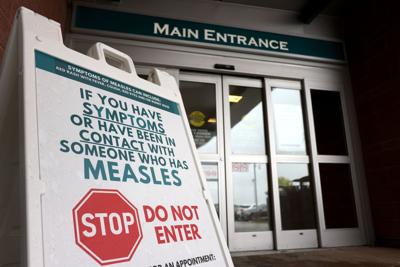Almost a year after the measles virus took hold in Ontario, the province is starting to see signs that the months-long outbreak that has sickened more than 2,300 people and sent dozens to hospital is slowing.
Following several weeks of declining numbers, data released Thursday shows there have been no outbreak-linked measles cases in the province since Aug. 21. Experts say itŌĆÖs a signal the outbreak may be burning out.
ŌĆ£We continue to be very vigilant ŌĆ” but we are feeling cautiously optimistic about the declines that we’ve been seeing,ŌĆØ said Dr. Christine Navarro, a public health physician at Public Health Ontario.
According to national guidance from the Public Health Agency of Canada, a measles outbreak can be declared over after at least 46 days following the rash onset date┬ĀŌĆö or the date that a caseŌĆÖs measles rash appeared┬ĀŌĆö of the last outbreak-associated case, Navarro said. That time period is to account for reporting delays or the emergence of previously undiagnosed cases.
ŌĆ£Here in Ontario, weŌĆÖre still a little bit of time away from that 46 days,ŌĆØ Navarro said, adding that the outbreak will only be declared over after discussions between Public Health Ontario, local public health units and the Ministry of Health.
OntarioŌĆÖs measles outbreak started last October after an infected traveller from New Brunswick arrived in the province.
At first concentrated in southwestern Ontario, the outbreak has spread to 26 public health units, and a total of 2,375 cases have now been recorded, the majority unimmunized infants, children and teens, according to . At its height last spring, about 100 new cases were being added to the provincial tally each week.┬Ā
Navarro said she and her colleagues are closely watching for any new outbreak-associated cases as well as monitoring information on cases occurring among pregnant people or newborns, the populations among the highest risk for severe infection.
So far in the outbreak, 51 pregnant people have been sickened with measles, 43 of whom were unvaccinated. Health officials have also reported nine cases of congenital measles, meaning the infection was diagnosed in the first 10 days following birth. Earlier this year, an infant with congenital measles who was born pre-term and who had underlying medical conditions died.
Dawn Bowdish, an immunologist and professor of medicine at McMaster University, said measles cases associated with the outbreak appear to be waning in other parts of the country, though cases remain high in Alberta. This year, Canada has recorded 4,972 measles infections, most of which are linked to the multi-jurisdictional outbreak.
Public health officials are warning that Canada is at risk of losing its elimination status for measles┬ĀŌĆö which the country has held since 1998┬ĀŌĆö unless the outbreak can be curbed by October. Bowdish said whether Canada can control the epidemic in that timeline is ŌĆ£an open-ended question.ŌĆØ
She said even as cases decline, public health officials need to remain vigilant┬ĀŌĆö not just on the watch for current infections but planning for the next measles outbreak, which includes boosting immunization rates. Earlier this month, Ontario’s chief medical officer of health stressed the need for a provincial vaccine registry so public health units can track immunization levels in real time.┬Ā
ŌĆ£Now’s the time to regroup and replan and get a lot of the systems in place to make sure that this doesn’t happen again,ŌĆØ Bowdish said. ŌĆ£Because as long as there’s new babies born, there’s people who are going to be vulnerable to measles. We could have another outbreak again, easily.ŌĆØ





























To join the conversation set a first and last name in your user profile.
Sign in or register for free to join the Conversation